World Poetry Day 2023: Indigenous-Minority Poetry from China
In the one-hundred-year history of Chinese modern poetry, there have been many efforts made for a new breakthrough, such as using vernacular language, new formal writing, avant-garde writing, dialect writing, new nature poetry, etc. but nothing has been more successful (as a breakthrough) than Mother Tongue Writing and Bilingual Writing by ethnic minority poets in recent years. It embodies regional poetry 地方诗歌 vs. official poetry 官方诗歌, periphery vs. center, oral vs. written literature, local writing vs. Western influences, long narratives vs. short lyrical poems, eco-poetry vs. nature poetry, among many other literary and aesthetic dualities and conflicts. Aku Wuwu 阿库乌雾 is the first poet writing in Yi that has transformed ancient religious Yi rhyming epics into modern free verse since 1984; Shadette Gamarie 萨黛特·加马力 is the first Kyrgyz poet of modernist poetry since 1985; Bukun Ismahasan Islituan卜袞·伊斯瑪哈單·伊斯立端 wrote the first ballad in Bunun in 1977 and started writing poetry in Bunun in 1987; Gebu 哥布, the first Hani poet ever, publishing Chinese poetry since 1985 and modern Hani epics in Hani since 1989; A Su 阿苏, one of the few bilingual Xibe poets that blends avant-garde elements into folk poetry; Nie Le 聂勒, the first Wa poet ever, with bilingual publications since 1996; Luruo Diji 魯若迪基, the first Pumi poet, reciting his Pumi poems around the country; Kongno 坤努, one of the very few bilingual women poets in the Jingpho community; Wolfman 人狼格, one of the rare Naxi poets that speak Naxi and as a Naxi singer promoting Naxi through his bilingual lyrics; and Li Hui 李輝 who has rediscovered his ethnicity and mother tongue as Dônđäc (not one of the 56 officially identified ethnic groups in China) through field investigation and research work, to name just a few outstanding ones.
…
Ethnic minority poets have been continuously emerging in the last forty years but booming in recent five years. The Grand Exhibition of China’s Marginalized Ethnic Poetry (independently compiled by Fa Xing in 2009) was actually in Chinese. The 2010 edition of Ten Outstanding Minority Poets (Writer’s Union Press) was exclusively of minority poets writing in Chinese. The 2018 bilingual edition of Ten Outstanding Young Tibetan Poets (Sichuan People’s Press) was translated into Tibetan by ten professional translators. Soon after that, a large number of bilingual Tibetan, Uyghur and Yi poets appeared on the internet, changing the landscape of minority writing in China.
…
The fifty-five officially recognized minority groups consist of less than 9% of the total population in China but they occupy 64% of the land (mostly in the peripheral regions). 117 out of the 129 minority languages are classified as endangered languages. It was due to the awareness of the endangered status that many poets such as Aku Wuwu, Gebu, A Su, Nie Le, Luruo Diji and Kongno started Mother Tongue Recitation and Mother Tongue Writing to save their ethnic languages. Many other poets have made various efforts to promote their literature and cultures: Shadette Gamarie has compiled an anthology of literature from Kyrgyz and translated authors of several languages such as Kyrgyz, Kazakh and Uyghur into Chinese; Samarkand 撒玛尔罕 has compiled an anthology of poetry from Salar nationality; Ha Sen 哈森 has translated many Mongolian poets into Chinese and Aynur Mawltbek 阿依努尔·毛吾力提 from Kazakh into Chinese; Wolfman as a popular singer sings bilingual songs to promote Naxi; Li Hui, as a molecular anthropologist, has written enthusiastically about Dônđäc as an ethnic minority speech rather than a Shanghai dialect; Bukun Ismahasan Islituan from Taiwan has been tirelessly promoting indigenous Bunun by writing and performing his bilingual poetry in Bunun and Chinese; and Puchi Daling 普驰达岭, who is familiar with classical Yi and modern Yi as well as classical Chinese poetry and modern poetry in general, has devoted much of his time introducing Yi literature and doing research work in addition to his literary career as a prolific poet and scholar of Tibeto-Burman studies.
…
History of China’s literature has been the history of Han Chinese literature. There has been a separate history of ethnic minority literature in China. The grand thirty volumes of One Hundred Year Chinese Poetry (Changjiang Wenyi Press, 2013) included less than ten minority poets (Shen Congwen, Niu Han, Xi Murong, Jidi Majia, Aku Wuwu, He Xiaozhu, Na Ye and Meng Yifei). Poets such as Gebu, Nie Le and Luruo Diji who have received the Junma (Gallant Horse) Literature Awards 骏马奖, the highest award for minority writers in China, are very often neglected by “mainstream” poetry circles.
…
Some of these minority poets, bilingual or monolingual, have become a vital part of contemporary Chinese poetry. He Zhong 贺中 was a member of the Lhasa School of Literature from the 1980s, a term used by critics in the subsequent years. Meng Yifei 梦亦非 is a representative of the post-70s generation and a major promoter of regional poetry as opposed to the central official poetry. Feng Na and Zhong Xiuhua are new voices of women’s writing in China. But many others have been sheltered or underestimated, such as Dilmurat Talat 狄力木拉提•泰来提, Gebu, A Su, Anaer 阿娜尔, Aynur Mawltbek, Na Sa 那萨, Xi Chu 西楚, Yungdrung Gyurmè 永中久美, Jike Bu 吉克·布, Tenzin Pelmo 丹增白姆, etc. which is part of my motivations to conduct this project.
—Excerpts from “The Other Mother Tongues and Minority Writing in China” by Ming Di, a chapter from Mother Tongues and Other Tongues: Creating and Translating Sinophone Poetry, edited by Martina Codeluppi and Simona Gallo, forthcoming.
Authors in the order of appearance in the video collection “World Poetry Day 2023—Indigenous-Minority Poets from China 世界詩歌日 多民族詩人母語朗誦”:
1. Bayin Hehe (b.1985, Machu nationality from Jilin)
2. Nimei Nami (b.1974, Naxi nationality from Yunnan)
3. Qin Shuxia (b.2000, Zhuang nationality from Guangxi)
4. Lama Itzot (b.1987, Nuosu Yi from Sichuan)
5. Li Xingqing (b.1993, Li nationality from Hainan Island)
6. Hai Yan (Miao-Hmong from Guizhou)
7. Feng Maojun (b.1974, Lisu nationality from Yunnan)
8. Aili Munuo (b.1970, De’ang nationality from Yunnan)
9. Aynur Abdukerim (b.1975, Uyghur from Xinjiang)
10. Suolang Ciren (b.1992, Luoba from Tibet)
11. Wang Mei (b.1973. Tai nationality from Yunnan)
12. Zhan Jiayu (b.1982, Dong from southern Guizhou)
13. Pan Nianying (b.1963, Dong from northern Guizhou)
14. Tong Qi (b.1993, Yi nationality from Yunnan)
15. Huang Xiufeng (b.1974, Pan Yao from Guangxi)
16. Shung Shuang (Landian Yao from Yunnan)
Compiled by: Poetry Across the Oceans
Video editing: Ming Di, Xi Chu, Jiwu Wuxiamo
English Translation: Poetry Across the Oceans
Partially supported by DJS Art Foundation, a partner of Lyrikline
20 Poets Recorded and Collected in February 2023:
- Pan Mei (b. 1987), Buyi from Guizhou
- Lan Dingguan (b. 1996), Yao from Guangxi (reading in Zhuang)
- Shadette Gamarie (b. 1968), Kyrgyz from Xinjiang
- Pan Nianying (b. 1963), Dong (Kam) from Guizhou
- Li Hui (b. 1978), Dônđäc from Shanghai
- Na Sa (b. 1977), Kham Tibetan from Qinghai
- Wolfman (Li Chenghan, b. 1965), Naxi from Yunnan
- Jibu Riluo (b. 1994), Nuosu Yi from Sichuan
- Chakdor Gyal (b. 1985), Amdo Tibetan from Qinghai
- Norzin Dolma (b. 1999), Amdo Tibetan from Sichuan
- Pan Liwen (b. 1975), Shui from Guizhou
- He Fukai (b. 1976), Naxi from Yunnan
- Solongod Todgerel (b. 1980) Mongolian from Inner Mongolia
- Hazhibek Aidarhan (b. 1979) Kazakh from Xinjiang
- Yi Wei (Yang Yilong, b. 1971), Bai from Yunnan
- Luo Yu (b. 1983), Yi from Guizhou
- Wu Tianwei (b. 1991), Buyi from Guizhou
- Mohammedyehya Tusunbaki (b. 2001), Uyghur from Xinjiang
- Zhong Xiuhua (b. 1980), ethnic She from Jiangxi
- Aku Wuwu (b. 1964), Nuosu Yi from Sichuan
Twelve Poets Recorded and Collected in February 2022:
- Aliye Rusol (b. 1992), Uyghur from Xinjiang
- Sugasela (b. 1976), Nuosu Yi from Sichuan
- Tenzin Pelmo (b. 2000), Ü Tibetan from Lhasa, Tibet
- Xi Chu (b. 1976), Miao (Hmong) from Guizhou
- Chungkyi (b. 1978), Ü Tibetan from Lhasa, Tibet
- Samer Darkpa (b. 1989), Amdo Tibetan from Gansu
- Turahan Tohuti (1968), Uyghur from Xinjiang
- Yungdrung Gyurmè (b. 1985), Tsang Tibetan from Back Tibet
- Kongno (1968), Jingpho from Yunnan
- Asu Sumur (b. 1962), Xibe from Xinjiang
- Anaer (b. 1963), Oirat Mongolian from Xinjiang
- Nie Le (b. 1968), Wa from Yunnan
Video editing: Ming Di, Xi Chu, Sun Amu
Translation of the poems: as indicated in the video
Compiled by: PoetryEastWest—Poetry Across the Oceans
Partially supported by DJS Art Foundation, a partner of Lyrikline
Call for entries for the ZEBRA Poetry Film Festival 2023
In 2023, the ZEBRA Poetry Film Festival is inviting entries for the International Poetry Film Competition! Eligible for entry are short films, based on poems of no more than 15 minutes duration, produced in or after 2022. All languages are allowed. The competition winners will be awarded prize money. A program committee will select films for the International Competition and for all other festival programs. The winning films will be chosen by a jury composed of representatives from the worlds of poetry, film, and media.
Closing date for entries: 1 June 2023 (postmark date)
Find the contact and submission information here.
The 14th ZEBRA Poetry Film Festival runs from 12th to 15th of October 2023 in the Kino in der Kulturbrauerei and in the Haus für Poesie. It is the largest international platform for poetry film worldwide. Since 2002 it offers poets, film and festival makers from all over the world room for creative exchange, brainstorming and meeting with a broad audience. With a competition, film programs, poetry readings, retrospectives, exhibitions, performances, workshops, colloquia, lectures and a children’s program, it presents in various sections the diversity of the genre of poetry film.
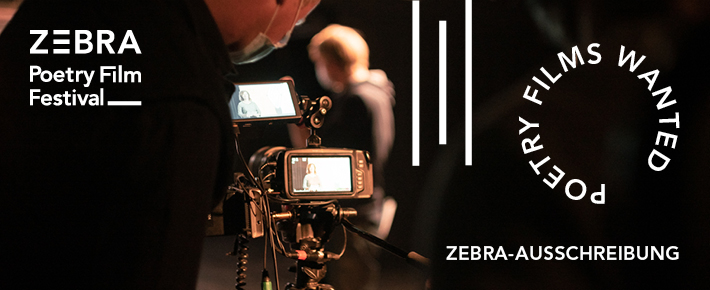
Das ZEBRA Poetry Film Festival schreibt zum 1. Februar 2023 den Wettbewerb um die besten internationalen Poesiefilme aus! Eingereicht werden können ab dem 1. Januar 2022 produzierte Kurzfilme, die auf Gedichten basieren und nicht länger als 15 Minuten sind. Alle Sprachen sind zugelassen. Dieser Wettbewerb ist dotiert.
Aus den Einsendungen trifft eine Programmkommission die Filmauswahl für den internationalen Wettbewerb und für alle weiteren Programme des Festivals. Eine aus Vertreter:innen der Bereiche Dichtung, Film und Medien besetzte Jury kürt die Gewinnerfilme.
Alles Weitere zur Ausschreibung und Einreichung findet sich hier.
Das 14. ZEBRA Poetry Film Festival findet vom 12. bis 15. Oktober 2023 im Kino in der Kulturbrauerei und im Haus für Poesie statt. Es ist die größte internationale Plattform für den Poesiefilm weltweit. Seit 2002 bietet es Dichter:innen, Filme- und Festivalmacher:innen aus aller Welt einen Raum zum kreativen Austausch, zur Ideenfindung und der Begegnung mit einem breiten Publikum. Mit einem Wettbewerb, mit Filmprogrammen, Lesungen von Dichter:innen, Retrospektiven, Ausstellungen, Performances, Workshops, Kolloquien, Vorträgen und einem Kinderprogramm präsentiert es in verschiedenen Sektionen die Mannigfaltigkeit des Genres Poesiefilm.
World Poetry Day 2022 – May these be words of hope, faith and comfort
Einen Waffenstillstand, einen Waffenstillstand, nur um die
Absicht zu prüfen,
Es kann ja sein, daß ein Stück Frieden in die Seele sickert
Und wir mit Poesie um die Liebe der Dinge wetteifern.
Mahmud Darwisch, Belagerungszustand (original: ar, translation: de)
my mother red with laughter, my father cupping
his left hand under his armpit, doing the dance
of old Ukraine, the sound of his skin half drum,
half fart, the world at least a meadow,
the three of us whirling and singing, the three of us
screaming and falling, as if we were dying,
as if we could never stop – in 1945 –
Gerald Stern, The Dancing (original: en, translations: de, he)
I survived somehow, and now we have peace (…) again.
I have no idea what I will do next.
Sándor Tatár, „War and Peace”
(original: hu, translations: de, en, dk, is, he, fr, nl, ka, ro, it)
gesagtes und leiden stumm
in zwei worten genannt
in drei schmerzen gebannt
und lasst uns die herzen befreien
befreit das leiden
Tanella Boni, [parole et souffrance muettes] (original: fr, translation: de)
And this must be
a sort of peace:
a botanical secret
of light
Ana Luísa Amaral, Uma botânica da paz: visitação
(original: pt, translations: de, en)
Schmerz wirkt unterschiedlich
in verschiedenen Orten
Zum Beispiel
Ich habe nur Kopfschmerzen
Du hast verloren nur eine Hand
Er alles
Mustapha Samady, دردستان – Schmerzland (original: fa, translation: de)
Silbern ist der Wind, der zu jeder Stunde des Vergessens drei
zusätzliche Stunden des Vergessens hinzufügt, die sich immerfort
in der Gegenwart ereignen;
[…]
Silbern ist der Flug der Möwe, die das Gesagte und das Verschwiegene zusammennäht
und einen dauerhaften Waffenstillstand mit dem Läuten der Abendglocken stiftet
Uroš Zupan, Srebro (original: sl, translation: de)
after the war,
what do we do
with the guns
and the machetes?
Natalia Molebatsi, after the war
(original: en, translation: de)
Let someone say on your behalf
that those towers don’t tumble down
Nothing happens to them
Those people never end
Tushar Dhawal, Papa, look (original: hi, translations: en, de)
Meine Müh im Heer –
Eine Kreisumkehr.
Der Bruder mein
War verkehrt der Feind.
Olga Martynova, Tschwirik im Krieg (original: ru, translations: de, sr, sv)
und ich frage: wer ist dieser ruhm
und was macht er mit den herzen
er schenkt der sinnlosigkeit ringsum ein wenig sinn
als wäre doch nicht alles umsonst
Volha Hapeyeva, schwarzer apfelbaum (original: hi, translations: en, de)
The old butterfly flaps its slender wings through the smoky air
exhausted and breathless
he flies over the ashy battlefields
and lays his powdery, golden trail
on the wailing grounds
[…]
he breathes in all the unborn flowers
and he lives.
Ketty Nivyabandi, Hope (original: en, translation: de)
herr
laß uns das gespräch wieder aufnehmen
nach langem erzwungenem schweigen
nachdem du deine geschöpfe denaturiert hast
in auschwitz
in hiroshima
in halabtsche
in srebrenica
gehst du nun auf die knie vor den opfern?
und vor den tätern auch?
und glaubst du
daß wir die Versuchung zu einer noch radikaleren
liebe überstehen
ohne dein wort?
SAID, Psalmen (Auszug) (original: de, translations: en, fr)
Forgiveness
is to renounce voluntarily
the legitimate claim to vengeance.
Vergeben
ist freiwilliger Verzicht
auf das legitime Recht
der Rache.
Odile Arqué, Perdonar (original: ca, translation: de, en)
Ich hab Leben gewählt
mit dem ganzen Ballast
die Füße sind schwer
es versagt mir die Stimme
Ilana Shmueli, [Neige dich zu deinen Toten / Ich hab Leben gewählt]
(original: de, translations: ar, fr)
stilles leben, Stilleben; die farbwelt dieser kompositon wird von
mattgelb dominiert; die blutorangen in der kristallschale
erinnern an kriegsveteranen bei tagesanbruch im schwimmbad,
dessen panoramafenster voller spritzer und fingerabdrücke
sind: gefilterter unreiner morgenschein, altgold; die komposition
verewigt den frieden, den die welt geben kann
Risto Oikarinen, [hiljaiselo, Stilleben…] (original: fi, translations: de, sv)
Call for entries for the ZEBRA Poetry Film Festival 2021
Also in 2021, the ZEBRA Poetry Film Festival in Berlin is inviting entries for its competition for the best international poetry films. Eligible for entry are international short films produced from 1st of January 2020, which are based on poems and are no more than 20 minutes in duration. All languages are allowed. The competition winners will be awarded prize money. A programme committee will select films for the international competition and for all the other festival programmes from among the entries. At the festival, the winning films will be selected by a jury comprising international representatives from the worlds of poetry, film and media.
In addition, ZEBRA is inviting filmmakers to submit a film interpretation of this year’s festival poem “going to Pasárgada” by the poet Odile Kennel. Text and audio of the poem together with translations come from lyrikline.org. The directors of the three best film interpretations will be chosen by the programme committee and invited to come to Berlin where they will have the opportunity to present their films at the festival and discuss them with the poet. (The festival poem may be used only for the purpose of film interpretation within the scope of this call for entries. For any other use at other festivals or on other platforms, etc. the film makers must obtain the rights from the rights holders.)
Entry deadline is the 1st of July 2021.
Questions? – Contact zebra(at)haus-fuer-poesie.org
Conditions of participation and registration form

Ausschreibung für das ZEBRA Poetry Film Festival 2021
Auch im Jahr 2021 schreibt das ZEBRA Poetry Film Festival in Berlin den Wettbewerb um die besten internationalen Poesiefilme aus. Eingereicht werden können ab dem 1. Januar 2020 produzierte Kurzfilme, die auf Gedichten basieren und nicht länger als 20 Minuten sind. Alle Sprachen sind zugelassen. Der Wettbewerb ist dotiert. Aus den Einsendungen trifft eine Programmkommission die Filmauswahl für den Internationalen Wettbewerb und für alle weiteren Programme des Festivals. Zum Festival kürt eine aus internationalen VertreterInnen der Bereiche Dichtung, Film und Medien besetzte Jury die Gewinnerfilme.
Darüber hinaus lädt das ZEBRA ein, das diesjährige Festivalgedicht „nach Pasárgada“ der Lyrikerin Odile Kennel zu verfilmen. Das Gedicht in Text, Ton und in Übersetzungen wird von lyrikline.org zur Verfügung gestellt. Die RegisseurInnen der drei besten Verfilmungen werden nach Berlin eingeladen. Sie bekommen die Möglichkeit, ihre Filme im Festival vorzustellen und mit der Dichterin zu diskutieren. (Das Festivalgedicht darf ausschließlich zur Verfilmung im Rahmen dieser Ausschreibung verwendet werden. Für jede weitere Verwendung bei anderen Festivals, Plattformen etc. müssen die FilmemacherInnen die Rechte mit den RechteinhaberInnen klären.)
Bei Fragen wenden Sie sich an: zebra(at)haus-fuer-poesie.org
Der Einsendeschluss ist der 1. Juli 2021.
Call for entries for the ZEBRA Poetry Film Festival 2020
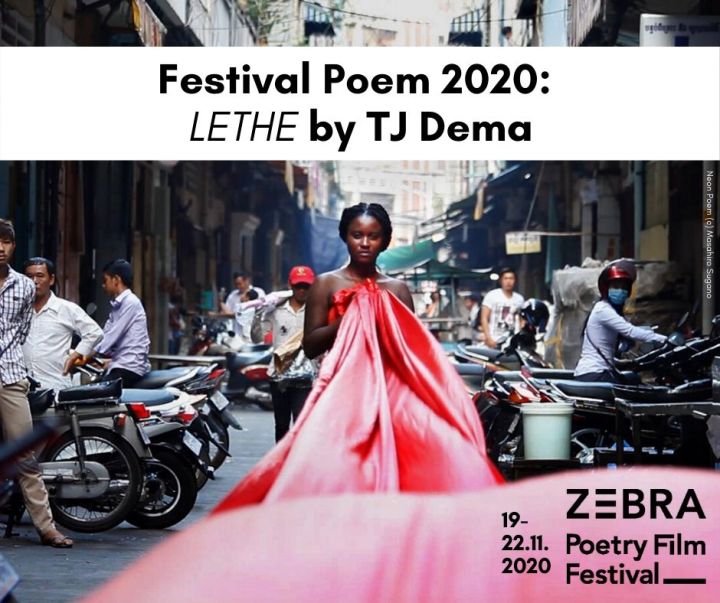 In 2020, the ZEBRA Poetry Film Festival is inviting entries for the International Competition to find the best poetry films! Eligible for entry are short films produced in or after 2018, which are based on poems and are no more than 20 minutes in duration. All languages are allowed. The competition winners will be awarded prize money. A programme committee will select films for the International Competition and for all the other festival programmes from among the entries. The winning films will be chosen by a jury comprising representatives from the worlds of poetry, film and media.
In 2020, the ZEBRA Poetry Film Festival is inviting entries for the International Competition to find the best poetry films! Eligible for entry are short films produced in or after 2018, which are based on poems and are no more than 20 minutes in duration. All languages are allowed. The competition winners will be awarded prize money. A programme committee will select films for the International Competition and for all the other festival programmes from among the entries. The winning films will be chosen by a jury comprising representatives from the worlds of poetry, film and media.
ZEBRA is also inviting you to make a film interpretation of this year’s Festival Poem, “LETHE” by the poet TJ Dema. The directors of the three best film interpretations will be chosen by the programme committee and invited to come to Berlin where they will have the opportunity to present their films at the festival and discuss them with the poet. The Festival Poem may be used only for the purpose of film interpretation within the scope of this call for entries. For any other use at other festivals or on other platforms, etc. the film makers must obtain the rights from the rights holders. Text and audio of the poem can be found here at Lyrikline: https://www.lyrikline.org/en/poems/lethe-10308
Closing date for entries: 1. July 2020 (date as postmark)
The call for entries can be found here: https://www.haus-fuer-poesie.org/en/zebra-poetry-film-festival/call-entries/
Questions? – Contact us via zebra(at)haus-fuer-poesie.org
The ZEBRA Poetry Film Festival is organized by the Haus für Poesie in co-operation with interfilm Berlin and CineStar Kino in der KulturBrauerei. With the kind support of the Senatsverwaltung für Kultur und Europa.
_______________
Ausschreibung für ZEBRA Poetry Film Festival 2020
2020 schreibt das ZEBRA Poetry Film Festival den Wettbewerb um die besten internationalen Poesiefilme aus! Eingereicht werden können ab 2018 produzierte Kurzfilme, die auf Gedichten basieren und nicht länger als 20 Minuten sind. Alle Sprachen sind zugelassen. Der Wettbewerb ist dotiert. Aus den Einsendungen trifft eine Programmkommission die Filmauswahl für den internationalen Wettbewerb und für alle weiteren Programme des Festivals. Eine aus Vertreter*innen der Bereiche Dichtung, Film und Medien besetzte Jury kürt die Gewinnerfilme.
Darüber hinaus lädt ZEBRA ein, das diesjährige Festivalgedicht „LETHE“ der Lyrikerin TJ Dema zu verfilmen. Die Regisseur*innen der drei besten Verfilmungen werden von der Programmkommission ausgewählt und nach Berlin eingeladen. Sie bekommen die Möglichkeit, ihre Filme im Festival vorzustellen und mit der Dichterin zu diskutieren. Das Festivalgedicht darf ausschließlich zur Verfilmung im Rahmen dieser Ausschreibung verwendet werden. Für jede weitere Verwendung bei anderen Festivals, Plattformen etc. müssen die Filmemacher*innen die Rechte mit den Rechteinhabern klären. Das Gedicht findet sich in Text und Ton hier auf Lyrikline: https://www.lyrikline.org/de/gedichte/lethe-10308
Einsendeschluss: 1. Juli 2020 (Poststempel)
Die Ausschreibung finden Sie hier: https://www.haus-fuer-poesie.org/de/zebrapoetryfilmfestival/zebra-ausschreibung
Bei Fragen: zebra(at)haus-fuer-poesie.org
Das ZEBRA Poetry Film Festival ist ein Projekt des Haus für Poesie in Kooperation mit CineStar Kino in der KulturBrauerei und interfilm Berlin. Mit freundlicher Unterstützung durch die Senatsverwaltung für Kultur und Europa.
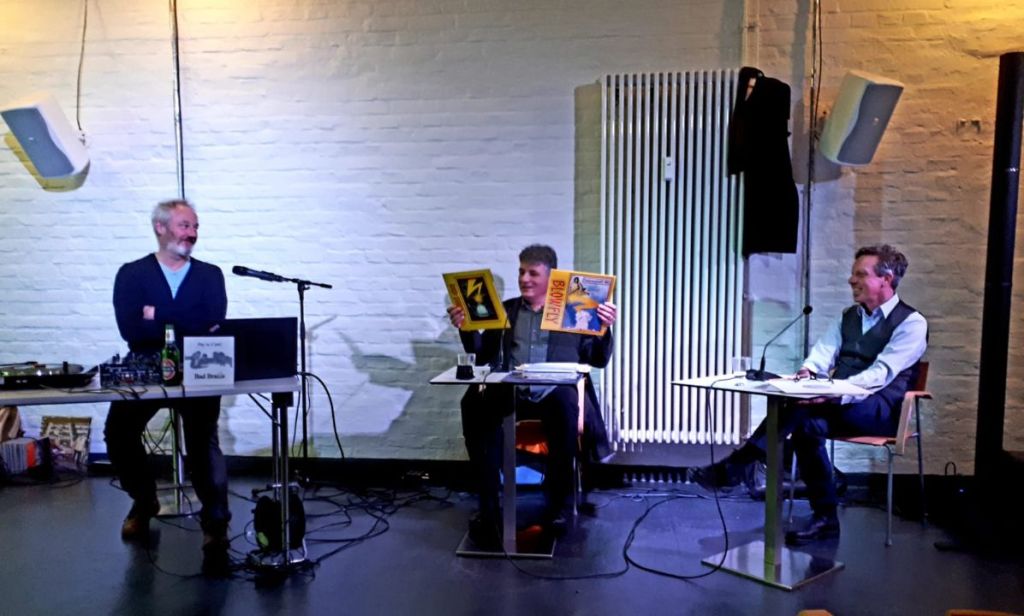
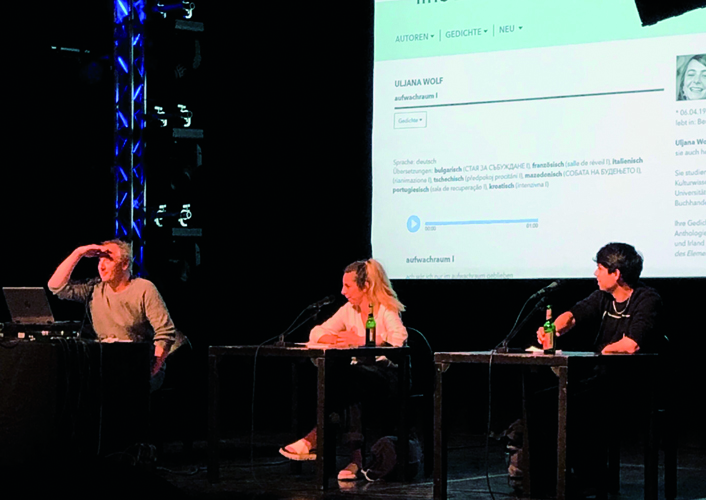

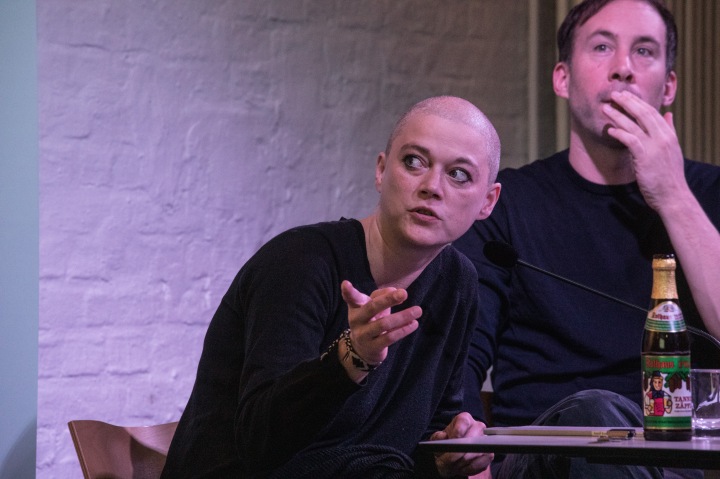
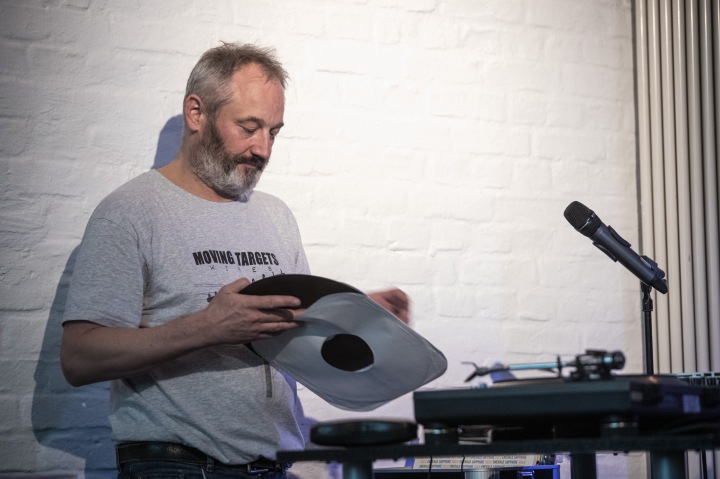
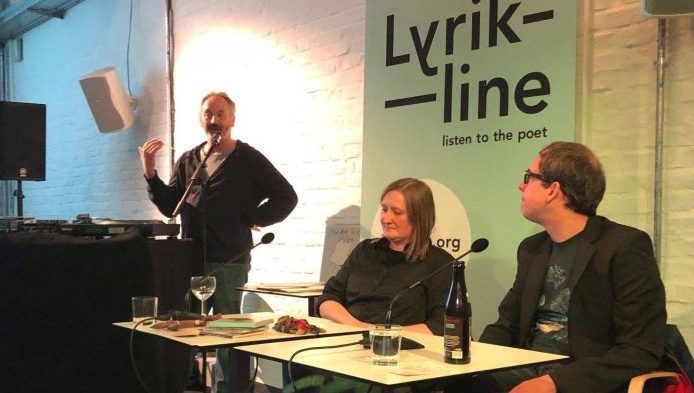
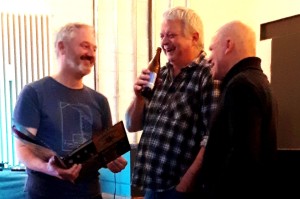
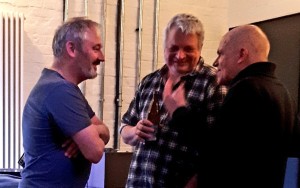



1 comment